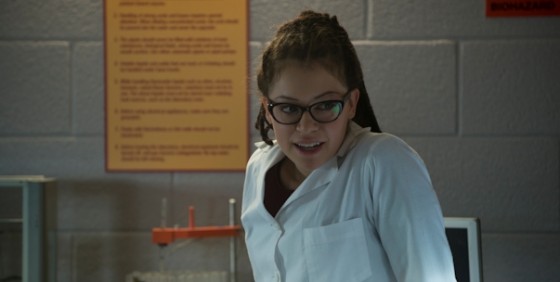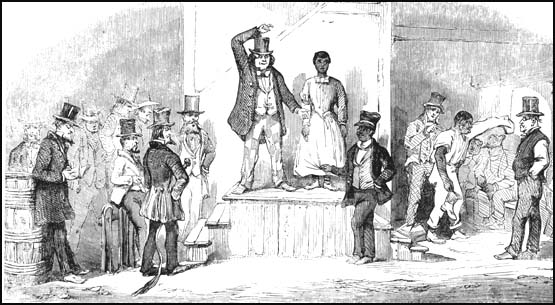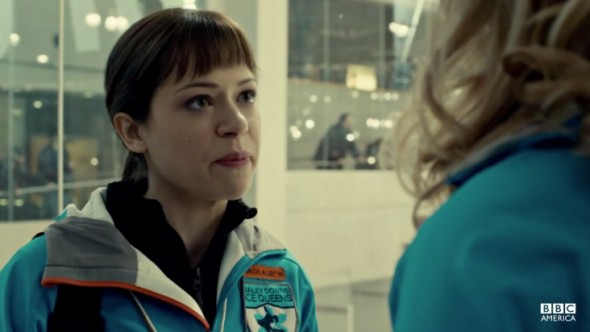While BBC America’s Orphan Black struggles with the occasional stock TV plot or cheesy line of dialogue, it deserves your Overthought attention for the originality of its premise and the boldness of its execution. Tatiana Maslany plays (among others) Sarah Manning, a streetwise hustler who starts a new life when she sees a woman who looks just like her jump in front of a train. In taking the decedent’s life, she uncovers a network of women her age who look exactly like her – clones, separated at birth and raised around the world, who are now being stalked by unknown threats. Sarah’s allies are her surviving clone sisters: hyper-anxious soccer mom Allison and science geek Cosima. Her enemies are legion: an order of religious zealots; biological visionary Dr. Aldous Leekie; and the mysterious Dyad Corporation.
It’s in the season finale, though, that the stakes really ramp up. Cosima decodes a sequence of “junk” DNA in Sarah’s blood sample and learns that the clones are all patented. If Sarah (or any of the clones) sign the contract that Dr. Leekie and Dyad proffer to them, they’ll be signing over their own lives as property. Sarah learns this moments before signing and flees with her sexy monitor Paul, but Allison signs hers without knowing.
In the real world, genetic patents are still a controversial subject. The U.S. Supreme Court ruled in June (while the show was still airing) that genes can’t actually be patented. On the one hand, we are justly scared at the prospect of corporations patenting pieces of our genome, owning our tissue without us ever having entered into contract with them. This ownership would grant them the right to withhold necessary life-saving treatment, a fate which Cosima contemplates in the finale and which the plaintiffs in Association for Molecular Pathology vs. Myriad Genetics, Inc. sued to overturn. On the other hand, the research and technology required to unlock the human genome requires hundreds of millions of dollars. Most corporations are unwilling to advance that far without something to guarantee them a profit, such as a patent.
But aside from the thorny legal and economic issues, there’s something terrifying about the prospect of someone else owning you. We’re not used to thinking of our genes as our “selves,” the way that we think of our bodies or thoughts, but it takes no more than a high school education and an eye on the news to know how much our genes have to do with our lives. The clones are not literal slaves of Dyad, but Cosima’s worsening condition suggests that their lives are in Dyad’s hands. When someone has a gun to your head, or medicine in their hands, they may as well own you regardless of what the law says. The idea that the law might actually protect this sort of extortion challenges our notions of self-ownership.
But what exactly does “self-ownership” mean?

If we’re gonna geek out, let’s call up the geek clone.
Step back a moment and untangle the concept with fresh eyes. In the exchange described by “self-ownership,” who is doing the owning and what is being owned? We might say that the “mind” owns the “body,” but this implies a mind/body dichotomy that’s neither philosophically useful nor scientifically accurate in this century. The division between mind and body grows fainter and less obvious with every new discovery; the idea that one “owns” the other should be equally antiquated.
Even with the mind/body dichotomy aside, the notion of a person as something whose ownership needs to be established – like an unfenced piece of land, or a car in probate, or a found wallet – should skeeve us out a bit. If I own my self, can I sell my self? If I sell my self to somebody, do they have absolute right to use and dispose of me as they like? And if so, how do they exercise that right except by my going along with it – thereby implying that I’m still in command, still ultimately the owner?
We’re no strangers to exploitative labor relationships in this or prior centuries – prostitution, sweatshop labor and the like. But short of outright slavery, no one has ever claimed absolute right of use and disposal over another person’s self. You’ll find factory owners who claim the right to keep workers in poorly ventilated factories, working twelve-hour shifts with few breaks – and, our progressive Western attitudes aside, you’ll find plenty of people lining up for such jobs. But you don’t find factory owners who claim a right to dictate a worker’s feelings toward a job, insisting that they not just stand at an assembly line for twelve hours but that they enjoy it as well. All the foreman wants is the product, on time and up to spec, with a minimum of grumbling. He doesn’t want to own the contents of your thoughts.
Conversely, many “knowledge worker” jobs want the exact opposite: an employee who devotes their mental effort to coming up with solutions to problems in a rapidly changing industry. These kind of jobs tend to be more forgiving of bodily needs: more sick time, fewer restrictions on bathroom breaks, better holiday schedules. Few employers, regardless of your notions of labor practices, demand complete ownership of a person’s activities and expression.
(Cynics and pro-labor types might point to company loyalty songs, anti-union counterintelligence, and even “teamwork begins with YOU!” posters as efforts by employees to ‘own’, or at least co-opt, the attitudes and motives of their employees. That’s fodder for a longer and more inflammatory article than this one, so the best I can do is note it and move on)
If self-ownership is possible, then self-sale should be possible. But it’s tough to imagine a contractual relationship whereby I might sign over my will to another person or institution. The best I can do is agree that I will use my will in service of theirs for a limited period of time.
Of course, we’re all familiar with a historical practice in which one person had absolute right of use and disposal over another.

If we look at the last five thousand years of recorded history, the notion that one human might not own another – that slavery wasn’t okay – is an eerily recent development. Humans have been treated as property in agricultural societies for quite some time. In fact, it’s only in slave societies that we see the anomaly of a person selling themselves into slavery. This was an occasional practice at the height of the Roman Empire, for instance: an educated Greek, selling themselves into a wealthy home as a tutor, saving up enough to buy back his freedom, and emerging in Roman society with freedom and contacts. What was inconceivable to use just a few paragraphs ago was apparently an honored tradition in the past.
So, given that we as a species have advanced beyond the concept of slavery, what use is the concept of self-ownership? Why do we cling to it? If, with the abolition of slavery, there is never a legal or moral circumstance in which one person might have complete right of use and disposal over another, why talk about self-ownership at all? Who might own my “self” if not me? Isn’t this purely tautological, and therefore unnecessary?
Here’s the rub: even if you can never truly sell yourself, you can lease a goodly portion. In a truly free marketplace, everything can be commoditized. Even if it’s epistemologically nonsensical to sell oneself entirely, you can always find someone who’s willing to sell eight hours of their time in a market where everyone else works for six. Then, to get an edge, the next candidate for the job has to work nine hours instead of eight. Then it’s ten hours, plus defending the company in private conversations and social media – selling your attitude and reputation as well as your labor. It may not be possible to sell one hundred percent of oneself into slavery – the decision to obey or disobey always resides within the commodified person – but people will auction off as much of themselves as the market will bear.
The season finale of Orphan Black presents us with several participants along that spectrum. On the far end, we have the newly revealed Rachel Duncan, the contemptuously nicknamed “proclone.” Blonde, humorless, and unfashionable in that way that only corporate movers can be, she has internalized the Dyad line so deeply that she can sell it to her sisters. She has not only sold herself, but she has apparently profited from the exchange. As a result, she can’t see why anyone else wouldn’t want to take such a sweet deal.
Just adjacent to her is Alison, who’s received a similar offer from Dr. Leekie. He pitches the contract to her as a “pragmatic and decisive individual.” She clearly doesn’t love the idea of dealing with Dyad, but she loves what the deal represents: security, stability, normality. It only takes her one last chaotic nudge into nightmare to get her to sign.

Nice scarf.
In the middle of the spectrum, we find Cosima. She’s had the most unsolicited interest in Dyad and Neolution to date, to the point that Sarah was worried about Cosima’s loyalty. She’s also the worst off in terms of health. But she also has the second best bargaining position, in that she (with Delphine’s help) decodes exactly what Dyad wants with the clones. For her, the need to play nice with Leekie is clear and present, but the risks of doing so are equally obvious.
At the opposite end of the spectrum, we have our chief protagonist, Sarah Manning. She walks away from the deal with Rachel, in the form of a defiant text message and a last-minute snub. No sooner has she done this, though, then she learns just how much control Dyad already has over her life by kidnapping her daughter.
Orphan Black cuts to the core of the paradox of self-ownership by exposing its hollowness. Dr. Leekie and Rachel Duncan offer each of the clones something in exchange for, literally, their birthright: protection for Sarah’s daughter; a stable life; access to their decoded genome. All of these are valuable rewards, but all of these are things that a self-actualized person, in a progressive Western society, should already have. Alison’s only living a paranoid nightmare because someone actually is spying on her. Cosima’s only in need of a cure because the people who made her, deliberately or accidentally, put her at risk. And the people Kira needs the most protection from are the ones who are offering Sarah that protection.
When someone puts a piece of paper in front of you and offers to sell you back your own life, it tells you three things. First, it reveals that they have a gun to your head, to use Sarah’s words. A stranger making this offer would get laughed off; someone who knows something about you should give you pause. Second, it tells you that what they’re offering is a bad deal, or else they’d let you negotiate over terms. Is the “stability” Alison buys by signing the contract anything more than an illusion – an illusion that will be pierced as soon as she realizes who her Monitor really is? If I were to offer you ten million dollars in exchange for your life, what incentive would I have to pay up?
Finally, it tells you exactly what your life is worth to the people trying to buy it. While every person’s life should be infinitely valuable to that person, strangers rarely see it that way. Leekie, Duncan and Dyad Corporation want something from the clones that they can’t take by force. To get it, they’re willing to reveal more about their methods and plans than they’d normally like to. It’s clearly not a total reveal, but it’s more than they’d volunteer if they could get Sarah’s genome by any other means. Given the lengths to which we’ve seen Leekie and his henchmen go to preserve Dyad’s secrecy, what they hope to learn from Sarah’s DNA is clearly valuable.
In any contract, no matter how much of your self you’re willing to sell, that portion of you doing the selling remains your own. The extent to which you surrender that portion – either trading it for the illusion of stability like Alison, or clinging fast in the face of certain doom like Sarah – defines the extent to which you can be said to own your self. And yet, when negotiating with someone who made you in a lab, there is a portion of yourself – your genetic code – that is already in their hands. The kind of people who would make such a deal are the sort of people with whom one should never make such a deal. This, then, is the paradox of self-ownership: that a party who’s willing to buy you is only proving that you’re too valuable to sell.


I’ve not seen the show (I’m entirely basing this comment on what’s in the article), nor do I have any more than a passing knowledge of the minutiae of US contract law, but in what sense is that contract possibly enforceable? All common law jurisdictions, as far as I’m aware, will set aside a contract if it is in some way illegal. Even before the recent case about the patentability of genomes, it was certainly illegal in America to own a person. No court would have enforced a contract that purported to do so.
Now, it seems that the Dyad Corporation is more than happy to engage in illegal activities like kidnapping anyway. Why should the legality of their contract matter? Well, simply put: a contract is nothing more than a means by which agreements can be made legally enforceable. I might agree to visit my mother on the weekend (in exchange for a promise of cookies, or whatever. Just in case you were worried about consideration.)… but in the event I don’t visit, she cannot sue me. There were no legally-recognised rights created by our agreement. Conversely, if I agree to buy an antique coin over the internet, there is an intention to create legal obligations. I want a remedy in case the seller doesn’t send me the coin, and the seller will want a remedy in the event I don’t pay. The essence of contract is the creation of obligations that will be enforced by the courts.
Which is why I find this a ridiculous situation. Why would a corporation, which is perfectly willing to go to any lengths to obtain what they want, bother to get people to sign an unenforceable contract? More than that, to sign an unenforceable contract that somehow *tricks* them into becoming property, based on the operation of patent law? Ie. using a contractual term to secretly bring into effect another set of legal rules to give Dyad a secret legal advantage over the clones…. none of which could possibly have legally mattered.
In the show, Dyad’s motives are still left mysterious, but IRL, companies try to make people sign unenforceable contracts all the time. If you’ve ever received an email with the text at the bottom that says “this information is confidential, by opening this email you agree to our terms…” or bought a ticket that on the back lists terms with language at the end that says “by purchasing this ticket you agree to our terms…” (parking garages in Los Angeles do this all the time), those are all unenforceable contracts. Legally, the company can’t assume consent after the fact, and since you can’t read these “contracts” until after you’ve taken the action that would imply consent (opening the email/buying the ticket), you can still violate the terms of the contract without legal repercussion (unless you do something that would be illegal anyway.) The reason that corporations even put these unenforceable contracts out in the first place is because most people will assume the contract is legally binding and will refrain from violating the contract.
The doctrine under which such contracts are usually recognized, is as contracts of adhesion, which are enforceable in most jurisdictions in the US, though the strength of the enforcement can be weaker than in cases of negotiated contracts.
The defect in the contracts described above is not that they are contracts of adhesion but that they are not contracts at all because you never agreed to them. The e-mail might SAY that you agree to its terms by opening it but if you didn’t have that information at the time you opened the e-mail it can hardly be said to be a manifestation of intent to be bound. This is different from the license agreements where you click “I Agree” after allegedly reading the license agreement.
Having seen the whole first season (which is all that currently exists), I should point out that this happens very late in the day (it’s the penultimate scene), so season two might answer this.
There’s also two big implied organisations/movements that we don’t know that much about either.
In summary, it’s a good job this series got renewed because otherwise, it’d be slightly lacking on the worldbuilding front.
To really dig deep in these questions, it might help to define terms. What does it mean to own something? It’s one of the questions that seems so simple until you (for example) spend a first-year law school class dealing with it. The metaphor used ad nauseum in that context is that property is a legal relationship that consists of a “bundle of sticks”–a number of recognized rights with regard to the thing that is owned. When you have enough of these rights, we say you “own” something. There are a lot of these, and not every ownership relationship gives all of these, but key ones include the right to possession, the right to exclude others, the right to dispose by will or inheritance, and the right to alienate (sell or give to others).
Which of these rights applies to our relationship to ourselves? We certainly have the right to exclude others from ourselves–one of the most treasured and basic rights. I suppose you could say we have the right to “possess” ourselves, but given the practical realities I’m not sure we can count that as a right granted by a legal relationship (we talk about “self-possession,” but that’s not exactly what we mean). You could argue we have the right to dispose of ourselves by will if you count our mortal remains as our “self” but I would argue that at the point of death whatever we call the “self” no longer exists so the right to dispose of the self at death is not meaningful.
That leaves the right of alienation. The article posits the question “If I own my self, can I sell my self?” I would flip that on its head. If you cannot sell your self, you do not own your self. Without the right of alienation, the “ownership” of the self would be based solely on the right to exclude and we generally wouldn’t say someone owns something merely because they have the right to exclude others from it.
The article suggests that we sell parts of ourselves–for example in a job environment. I would argue that there is a distinct difference between selling ones labor and selling ones self. We don’t really rent ourselves out for 8 hours when we work–during those 8 hours our employer doesn’t gain the right to touch us without our consent, for example.
If slavery doesn’t exist, then the self cannot be sold. If the self cannot be sold, we do not own our selves. Our relationship to ourselves is a unique one, and one that does not fit the rubric of ownership.